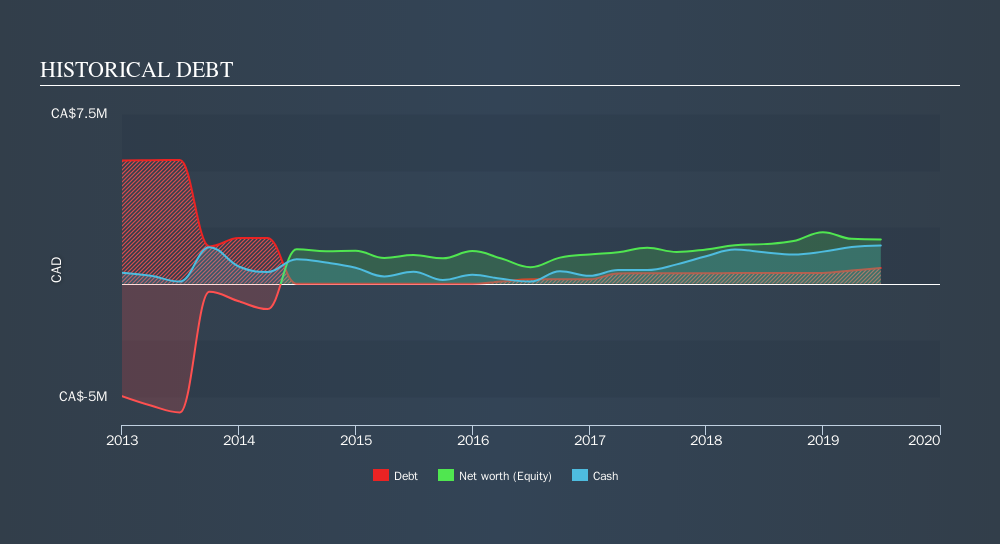Howard Marks put it nicely when he said that, rather than worrying about share price volatility, 'The possibility of permanent loss is the risk I worry about... and every practical investor I know worries about. So it might be obvious that you need to consider debt, when you think about how risky any given stock is, because too much debt can sink a company. Importantly, YANGAROO Inc. (CVE:YOO) does carry debt. But should shareholders be worried about its use of debt?
When Is Debt Dangerous?
Debt assists a business until the business has trouble paying it off, either with new capital or with free cash flow. In the worst case scenario, a company can go bankrupt if it cannot pay its creditors. However, a more usual (but still expensive) situation is where a company must dilute shareholders at a cheap share price simply to get debt under control. Of course, debt can be an important tool in businesses, particularly capital heavy businesses. The first thing to do when considering how much debt a business uses is to look at its cash and debt together.
See our latest analysis for YANGAROO
What Is YANGAROO's Net Debt?
You can click the graphic below for the historical numbers, but it shows that as of June 2019 YANGAROO had CA$698.0k of debt, an increase on CA$573.0k, over one year. But it also has CA$1.69m in cash to offset that, meaning it has CA$989.8k net cash.

How Healthy Is YANGAROO's Balance Sheet?
Zooming in on the latest balance sheet data, we can see that YANGAROO had liabilities of CA$2.10m due within 12 months and liabilities of CA$557.0k due beyond that. Offsetting these obligations, it had cash of CA$1.69m as well as receivables valued at CA$1.66m due within 12 months. So it actually has CA$687.3k more liquid assets than total liabilities.
This surplus suggests that YANGAROO has a conservative balance sheet, and could probably eliminate its debt without much difficulty. Succinctly put, YANGAROO boasts net cash, so it's fair to say it does not have a heavy debt load!
We also note that YANGAROO improved its EBIT from a last year's loss to a positive CA$96k. The balance sheet is clearly the area to focus on when you are analysing debt. But you can't view debt in total isolation; since YANGAROO will need earnings to service that debt. So when considering debt, it's definitely worth looking at the earnings trend. Click here for an interactive snapshot.
Finally, a company can only pay off debt with cold hard cash, not accounting profits. While YANGAROO has net cash on its balance sheet, it's still worth taking a look at its ability to convert earnings before interest and tax (EBIT) to free cash flow, to help us understand how quickly it is building (or eroding) that cash balance. Over the last year, YANGAROO actually produced more free cash flow than EBIT. That sort of strong cash conversion gets us as excited as the crowd when the beat drops at a Daft Punk concert.
Summing up
While it is always sensible to investigate a company's debt, in this case YANGAROO has CA$989.8k in net cash and a decent-looking balance sheet. The cherry on top was that in converted 402% of that EBIT to free cash flow, bringing in CA$386k. So we are not troubled with YANGAROO's debt use. Of course, we wouldn't say no to the extra confidence that we'd gain if we knew that YANGAROO insiders have been buying shares: if you're on the same wavelength, you can find out if insiders are buying by clicking this link.
If you're interested in investing in businesses that can grow profits without the burden of debt, then check out this free list of growing businesses that have net cash on the balance sheet.
We aim to bring you long-term focused research analysis driven by fundamental data. Note that our analysis may not factor in the latest price-sensitive company announcements or qualitative material.
If you spot an error that warrants correction, please contact the editor at editorial-team@simplywallst.com. This article by Simply Wall St is general in nature. It does not constitute a recommendation to buy or sell any stock, and does not take account of your objectives, or your financial situation. Simply Wall St has no position in the stocks mentioned. Thank you for reading.
About TSXV:YOO
YANGAROO
A software company, provides workflow management solutions for the media and entertainment industries in Canada and the United States.
Slight risk and fair value.
Market Insights
Community Narratives




